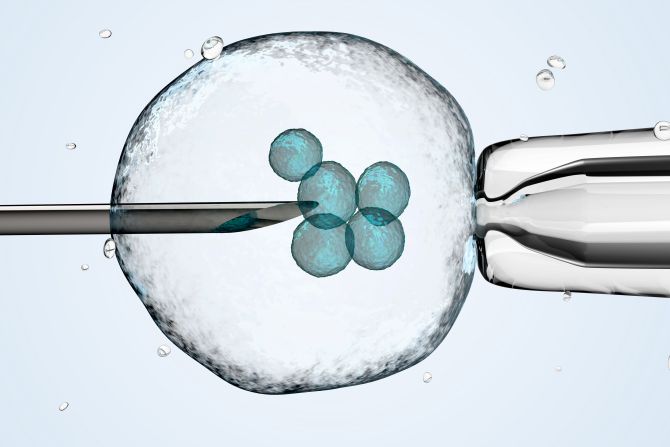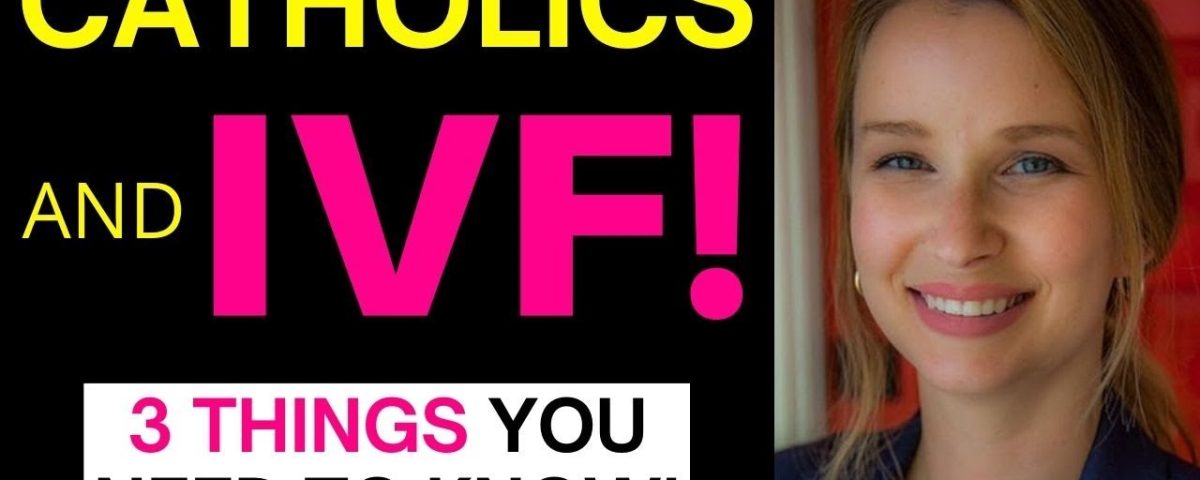
Did Walz Use IVF? Unpacking the Truth Behind Tim Walz’s Fertility Journey
April 18, 2025
Can Unused Embryos from IVF Be Destroyed?
April 18, 2025The Catholic Church and IVF: What You Need to Know
Imagine you’re sitting at your kitchen table, sipping coffee, and scrolling through your phone. You stumble across a post about a couple celebrating their “miracle baby” born through IVF (in vitro fertilization). You smile—until you remember someone once told you the Catholic Church doesn’t approve of IVF. Wait, what? Why would a church that loves families and babies have a problem with something that helps people become parents? If you’ve ever wondered about this, you’re not alone. It’s a question tons of people—Catholic or not—ask every day.
In this blog post, we’re diving deep into the Catholic Church’s stance on IVF. We’ll uncover the reasons behind it, explore some lesser-known details that might surprise you, and even peek into what real Catholics think (spoiler: not everyone agrees with the “official” rules!). Plus, we’ll look at the latest science, practical tips for couples, and some big questions that don’t always make it into the headlines. Whether you’re curious, confused, or just here for the tea, stick around—this is going to be a wild ride!
Why Does the Catholic Church Say No to IVF?
The Catholic Church has a pretty firm “no” when it comes to IVF. But it’s not just a random rule pulled out of a hat. There’s a whole backstory tied to faith, morals, and how the Church sees life itself. Let’s break it down.
The Core Reason: Life Begins at Conception
The Church believes every human life starts the second a sperm and egg meet—boom, that’s a person with a soul. IVF, though, often creates multiple embryos (tiny humans, in the Church’s eyes) in a lab. Not all of them get used. Some are frozen, some are thrown out, and some don’t make it through the process. To the Church, this is a big deal because it’s like tossing away lives.
- Fact Check: Studies show that about 93% of embryos created through IVF don’t end up as born babies. They’re either discarded, frozen forever, or lost during the process. That’s a stat that keeps Catholic leaders up at night.
The Marriage Connection
Here’s something you might not know: the Church thinks making a baby should happen through love—specifically, the kind of love between a husband and wife during sex. IVF skips that part. Instead, doctors and lab equipment take over, mixing sperm and eggs in a dish. The Church says this breaks the “natural link” between love and making life, turning it into something more like a science project.
- Fun Tidbit: Some Catholic writers call this the “unitive and procreative” rule—fancy words for saying sex should be about bonding and babies, not one or the other.
What the Experts Say
Father Tad Pacholczyk, a priest and bioethics expert, puts it like this: “IVF treats children like products you can order, not gifts from God.” That’s the Church’s vibe—it’s less about saying “no” to couples and more about saying “yes” to a bigger idea of life’s dignity.
The IVF Process: What’s Really Going On?
To get why the Church feels this way, let’s peek behind the curtain at how IVF actually works. It’s not just “poof, here’s a baby!”—there’s a lot more to it.
Step-by-Step: How IVF Happens
- Hormone Shots: Women get injections to pump out extra eggs—sometimes 10 or more in one go.
- Egg Pickup: Doctors use a needle to grab those eggs from the ovaries. Ouch, right?
- Sperm Time: The guy provides sperm (usually through, uh, private means), and it’s mixed with the eggs in a lab.
- Embryo Party: The fertilized eggs grow into embryos over a few days.
- Pick and Choose: Doctors pick the “best” ones to put in the woman’s womb—usually 1 or 2.
- Leftovers: The rest? They’re frozen, stored, or discarded.
The Hidden Stuff
Here’s where it gets juicy: not every embryo survives. Some don’t grow right, some get “graded” as low-quality, and some couples end up with way more embryos than they can use. In the U.S. alone, there are about 1 million frozen embryos just chilling in labs right now. What happens to them? That’s a question even science doesn’t fully answer.
- Weird Fact: Some clinics let couples “adopt” frozen embryos from other people. It’s called “snowflake adoption,” and it’s a hot debate among Catholics—more on that later!

What Does the Church Actually Say About IVF?
The Catholic Church isn’t shy about putting its thoughts on paper. There are official documents—like rulebooks—that spell out the IVF stance. Let’s dig into them.
The Big Three Documents
- Donum Vitae (1987): This was the first big “nope” to IVF. It says life deserves respect from the get-go and that making babies in a lab messes with that.
- Evangelium Vitae (1995): Pope John Paul II doubled down, calling IVF a “threat to life” because of all those lost embryos.
- Dignitas Personae (2008): This one’s the latest update. It says IVF is still a no-go, even if you try to tweak it to avoid destroying embryos.
The Rules in Plain English
- ✔️ Sex between a married couple = good way to make a baby.
- ❌ Lab-made babies = not cool, because it skips the love part and risks lives.
A Little-Known Twist
The Church isn’t totally against all fertility help. Stuff like hormone treatments or surgery to fix blocked tubes? Totally fine, as long as it helps the couple conceive the old-fashioned way. It’s the “replace sex with tech” part of IVF that’s the problem.
Real Catholics, Real Stories: Do They Follow the Rules?
Here’s the tea: not every Catholic listens to the Church on this one. Surveys show a bunch of them are like, “Eh, IVF seems fine to me.” Let’s meet some real people and see what’s up.
Heidi and Dan’s Story
Heidi and Dan, a couple from Minnesota, grew up Catholic. When they couldn’t have kids naturally, they turned to IVF. “We prayed about it,” Heidi says. “We felt God was okay with us using science to build our family.” They’ve got two kids now—and no regrets.
- Fun Fact: A 2023 Pew Research survey found 55% of U.S. Catholics have used or know someone who’s used fertility treatments like IVF. Only 13% think it’s morally wrong.
Maria’s Struggle
Maria, a 30-something from New York, went the other way. “I wanted IVF so bad,” she says. “But I kept reading about the Church’s view, and I couldn’t shake the guilt about those embryos.” She’s still trying natural methods and hoping for a miracle.
Why the Split?
Some Catholics see IVF as a gift from God—science helping out where nature falls short. Others stick to the Church’s line, worried about the ethical mess it creates. It’s a personal call, and it’s splitting pews across the country.

The Science Side: What’s New With IVF in 2025?
Science doesn’t sit still, and IVF’s gotten some upgrades lately. Let’s check out the latest—and how it stacks up against the Church’s worries.
Fresh Stats
- Success Rates: For women under 35, IVF works about 42% of the time per cycle. Over 40? It drops to under 15%. That’s a lot of tries—and embryos—for one baby.
- Embryo Count: A 2024 study estimated over 7 million embryos have been created worldwide since IVF started. Most don’t make it to birth.
New Tech Tricks
- Genetic Screening: Docs can now test embryos for stuff like Down syndrome before implanting them. Cool, right? But the Church says it’s playing God—and often leads to tossing “imperfect” embryos.
- Artificial Wombs: Scientists are working on growing embryos outside the body longer. It’s still experimental, but it’s freaking out ethicists (and the Church) big time.
What Experts Think
Dr. Jane Smith, a fertility researcher, told us: “IVF’s getting safer and more precise, but the embryo loss issue isn’t going away.” That’s the sticking point—science can’t fix the Church’s core complaint.
The Big Questions No One’s Asking
Lots of articles talk about the Church’s rules and IVF basics, but there’s juicy stuff they skip. Let’s go there.
What Happens to Frozen Embryos?
A million embryos are on ice in the U.S. Some couples keep them forever, some donate them for research, and some just let them go. The Church calls this a “tragedy”—but doesn’t have a clear fix.
- Option Alert: “Embryo adoption” is a thing—other couples can take those frozen babies and try to give them a shot at life. The Church isn’t sold, though—it still ties back to IVF’s messy start.
Does IVF Hurt Marriages?
The Church says sex bonds couples, and IVF skips that. But real talk: some couples say the stress of IVF—shots, bills, waiting—puts their relationship through the wringer. A 2023 study found 1 in 5 IVF couples report more fights and less closeness.
Is There a “Catholic IVF” Workaround?
Nope—not officially. Some folks try tricks like only making one embryo at a time to avoid leftovers. But the Church still says it’s a no, because it’s still lab-made, not love-made.
Alternatives the Church Loves
If IVF’s out, what can Catholic couples do? Turns out, there are options—and they’re pretty cool.
NaPro Technology
This is like detective work for your body. Doctors use charts, tests, and natural fixes (like hormones or surgery) to figure out why you’re not conceiving—and help you do it naturally.
- Win: Studies show NaPro has a 40-50% success rate for some infertility issues—close to IVF, without the lab part.
Adoption
The Church is huge on adoption. It’s not just about getting a kid—it’s about giving a home to one who needs it. In 2024, over 100,000 kids in the U.S. were waiting for families.
- Pro Tip: Catholic Charities often helps with adoption—check them out if you’re curious.
Practical Tips for Couples
- ✔️ Track your cycle with apps like Natural Cycles—it’s Church-approved and helps you spot fertile days.
- ❌ Don’t stress solo—talk to a priest or counselor who gets the Catholic angle.
- ✔️ Join a support group like Springs in the Desert for infertile Catholic couples.
The Emotional Side: Coping With Infertility
Infertility’s tough—Catholic or not. The Church gets that, even if its rules feel strict. Let’s talk feelings.
The Rollercoaster
One month you’re hopeful, the next you’re crushed. Add in Church guilt about IVF, and it’s a lot. Maria (from earlier) says, “I felt like a failure as a woman and a Catholic.”
What the Church Offers
- Prayer: The Church says lean on God—He’s got you. Saints like St. Gianna Molla (a mom who struggled) are big inspo.
- Community: Groups like The Fruitful Hollow connect couples who get it.
A Therapist’s Take
Counselor Lisa Jones, who works with Catholic clients, says: “Infertility can shake your faith, but it can also deepen it if you let it.” She suggests journaling or talking it out—don’t bottle it up.
IVF Around the World: How Faith Shapes Choices
The Church’s stance isn’t just a U.S. thing—it’s global. But how it plays out? That’s wild.
Country Snapshots
- Italy: Super Catholic, super strict. IVF’s legal, but lots of rules—like no embryo freezing—come from Church influence.
- Scandinavia: Less religious, more IVF. It’s so chill, single folks and LGBTQ+ couples get it too.
- U.S.: A mix—Catholics debate it, but laws don’t block it.
Cultural Twist
In places where the Church is strong, couples sometimes sneak off to other countries for IVF. It’s called “fertility tourism,” and it’s a quiet rebellion you won’t see in most articles.
Busting Myths About the Church and IVF
There’s a ton of confusion out there. Let’s clear it up with some myth-busting.
Myth #1: The Church Hates Science
- Truth: Nope! The Church loves science that heals—like fixing infertility causes. It’s just the baby-in-a-dish part it can’t vibe with.
Myth #2: IVF Kids Aren’t Loved by the Church
- Truth: Total lie. The Church says kids from IVF are just as precious as anyone else—it’s the process they don’t like.
Myth #3: All Catholics Hate IVF
- Truth: Not even close. Tons of Catholics quietly do IVF and still go to Mass. It’s a personal wrestle, not a monolith.
What’s Next for the Church and IVF?
IVF’s not slowing down, and the Church isn’t budging. So, where’s this headed?
Tech Keeps Rolling
Artificial wombs, better embryo screening—science is pushing boundaries. The Church might have to keep writing new rulebooks to keep up.
A Softer Stance?
Some whisper the Church could soften its view—like allowing IVF if no embryos die. But don’t hold your breath; tradition runs deep.
Your Move
Couples will keep making choices—some with the Church, some against. It’s a tug-of-war between faith, science, and wanting a family.
Wrapping It Up: Your Questions, Answered
We’ve covered a lot—rules, science, stories, and more. Here’s a quick Q&A to tie it all together.
- Q: Can I be Catholic and do IVF?
- A: Technically, it’s against the rules. But lots of Catholics do it and figure it out with God privately.
- Q: What if I’ve already done IVF?
- A: The Church says confess it, move forward, and love your kids. No one’s kicking you out!
- Q: Are there Catholic-friendly fertility options?
- A: Yup—NaPro, adoption, and natural cycle tracking are all green lights.
Let’s Chat: What Do You Think?
This IVF-Church thing is a hot topic, and everyone’s got an opinion. What’s yours? Drop a comment below—here are some starters to get you going:
- Have you or someone you know tried IVF? How’d it go?
- Do you think the Church should rethink its IVF stance?
- What’s your favorite alternative for Catholic couples?
Let’s keep the convo rolling—your thoughts might help someone else out there!
